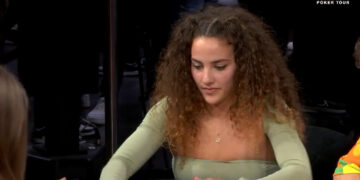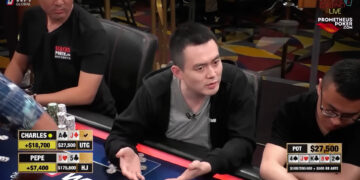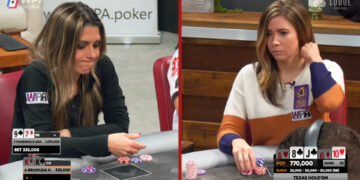I’m about to write about catching bluffs, which is a key aspect of poker tournaments. However, there is a very fine line you need to walk. On one hand, the biggest cashes of my life have come from catching bluffs in huge pots.
On the other hand, many of my busts have come from trying to catch bluffs in huge pots. This might confuse you, but there is one simple piece of advice later in this article that will help you. Before getting to catching bluffs, I have to cover a bunch of stuff. Let’s begin with you.
I know a lot of people who read these articles are low-stakes players and beginners. Based on feedback, I also know that more advanced players read these articles for three reasons. One, even if they play a different style of poker, they enjoy and appreciate my approach to the game.
It’s not that they want to adopt my style of play. It’s that they feel they might pick up one or two things up that they can add to their game. Two, it can act as a review. Three, they find my writing enjoyable to read. That third one is the biggest compliment for me. Thank you!
On this note, I recently had a DM conversation with a well-known and highly successful player somewhere in Florida. He is a technical player, so when he wrote, “I always enjoy reading your articles. Good Shit!” I was shocked. I’ll share a secret with you.
I always think that some poker pros think I’m a dumbass. I’m sure some of those people are out there, but I figured something out. Most poker players enjoy my writing regardless of their level of play. This is truly a pleasant surprise. It has nothing to do with who knows the game better. It has to do with: “This dude is way out there and has an interesting view of the game. I can learn some stuff.”
I guess I’ve had enough success to not feel need to defend myself. On the other hand, I’m currently playing in small online tournaments with buy-ins from $16-$51 and recently hit the red again. I went from black to red to black to red. I face three challenges with these tournaments.
One, my greatest intelligences are intrapersonal and interpersonal. Without live poker, I can’t apply the intrapersonal intelligence. At least not to the same degree.
Two, I’m writing a book about these tournaments and trying to prove the effectiveness of SPATS, but swinging back and forth between black and red isn’t a good start.
Three, since these buy-ins are low, there are a lot more calls, which increases variance. I try my best to adapt, and I have had some successes, but I have literally stone-cold bubbled in more than 10% of these tournaments, which is extremely difficult to achieve.
These variables sometimes make me feel not worthy at times. I’m just being honest. In my own defense, I’m very tough on myself. And every time I start thinking like this, I ship a tourney or go on a run of consistent cashes. I don’t know if that will happen here, but it has been a pattern. I also have to realize that I have been running very bad. For instance…
TODAY’S BUBBLE BUST

For some reason, I knew in the back of my mind that today’s bubble wouldn’t be a bad thing after all. I didn’t know why at the time, but now I realize it’s because I’m writing about it.
I was in 1st or 2nd for most of today’s tournament. This is a $16 buy-in so no big deal by bubbling, right? Wrong! As it turns out, it was this specific tournament—and only in this specific tournament—where late registration was open for four hours instead of 10 minutes. This led to me investing 4.5 hours in a $16 buy-in tournament and then bubbling. I was also way ahead in 1st when registration was supposed to end. I probably would have shipped it or finished second.
To make matters a little worse, when there were five of us remaining and three got paid, I stuck up for one of the late-reg players and said that she should get paid if she cashes. One other player agreed. One hesitantly agreed. The other didn’t say anything, which likely meant she didn’t like the idea. That’s cool. I was just trying to keep it friendly. What I’m trying to say is that I tried to do the right thing and bubbled, which is not an enjoyable experience.
The hand that I bubbled was not a bluff catcher, but it did have to do with reading someone’s hand. So, despite this article being titled ‘Catching A Bluff In Poker Tournaments,’ it’s still relevant information. And, yes, I realize I haven’t written a damn thing about catching bluffs yet. This is the one potential negative for flow writing. I have no idea where I’m going because I don’t outline anything, but I hope that also makes it more entertaining for you.
About that poker hand. I don’t remember exact chip counts. I’ll estimate.
I was at 14k UTG.
BB had 22k.
Cutoff had 11.5k.
I was dealt 88 UTG.
I think the BB was 400.
I raised to 1200 in a five-handed game (final table).
BB raised to 2400.
Cutoff jammed.
Looking back on this hand, this should have been an easy fold. At the time, my thinking was the following: Cutoff is likely jamming with AK/AQ, I need more 1st place finishes and fewer min-cashes and bubbles, and BB might fold because she’s an aggressive player and likely doesn’t have a monster.
Wait! What? Backup. Yeah … I know what you’re thinking: If I raised UTG and BB didn’t hesitate to re-pop me, then it’s a monster!
When someone raises 3x BB UTG, it’s usually strong. You could say it’s a five-handed game, but I’m also a TAG player. I’m not going to mess around in that spot and she knew that. Also consider that they usually do a Bubble Save in these tourneys. I wouldn’t put myself in a weird spot with anything marginal. Therefore, BB is only 3-betting me with a premium hand.
BB put both of us all-in. I wasn’t folding at that point.
I tabled my 88.
I was correct about Cutoff. It was AKo, and I would have beaten that hand.
BB had AA, which held, despite me turning a gut-shot (and still having the other two 8s in the deck).
Since the two short stacks busted on the same hand, there was no bubble to pay.
Top 3 remaining got paid.
I didn’t analyze that hand correctly because I was blinded by Greed! But unlike Ego, Greed is funny and bipolar. Sometimes it can be an ally. I have won a lot of Nightly events on the WSOP Circuit or at a casino poker room. My approach in those events is tight, tight, tight, and open the hell up at the final table when everyone gets tight.
That is what gets me first place (sometimes second or a chop). So, Gordon Gekko might have had a point after all. When you get greedy at the final table, you’re either taking 1st place or you end up disappointed. At least you go out swinging. In this instance, I should have evaluated the situation more. I was truly blinded by wanting 1st place.
At this point in the article, you might be thinking: I caught this motherf***er in a massive bluff because this was supposed to be about catching bluffs.
Chill, bro! It was just a little misdirection.
CATCHING BLUFFS

The two hands below are situations I witnessed the first one and I was involved in the second one.
Two limpers to Button.
Button raises 3x BB.
Blinds fold.
Two limpers in Middle Position call.
Flop: 374-rainbow.
Two players in MP check.
Button bets half pot.
Two players in MP call.
Turn: 9
Two players in MP check again.
River: 8
Two players in MP check.
Button goes all-in for 25 BBs.
No!
NO!
NO!!!
The Button definitely has AK, AQ, AJ, AT here. Think about any other potential winning hand in this spot and if they would follow that betting pattern. Hell No! And I’m gonna bold that shit so you remember it.
If the Button flopped a set, it’s highly unlikely he would bet half pot. If he had flopped a set, he would bet the pot to protect against a straight draw. Or he would check to trap because he wouldn’t put the two players in Middle Position on straight draws with that flop. A bet of half the pot here means: I don’t like this but I’m going to try to take it down with as minimal risk as possible.
The two players in Middle Position called the flop yet the Button bet the 9 on the turn after two checks. He bet this 9 because he sensed that the two checks were weakness. But if two players—not just one player—calls from Middle Position on that flop, there has to be a reason for it. What can it be? We’ll get to that.
Both players in Middle Position called the turn bet.
The river is an 8.
The Button now fires 25 BBs in an attempt to get two players in Middle Position to fold, but let’s take a look at this. The 9 on the turn doesn’t threaten anyone because the two players in Middle Position aren’t likely to be playing 65 when there was a 3x BB pre-flop raise. If one of the players in Middle Position feared the straight, they would raise the turn, but they didn’t fear the straight because the player on the Button is highly unlikely to raise 3x the BB pre-flop with 65.
The 8 on the river was also a non-threat. And the Button jamming the river is exactly what one of those players was waiting for. Why? Because he had a set of fours. Why else would he have been flatting until the river? He’s not going to flat with top pair on the flop out of position. He would want to take the hand down right there. He also didn’t fear JT. While this is possible, it’s not likely with a 3x BB pre-flop raise and then two half-pot bets. If the player on the Button truly senses weakness on the turn AND he has outs, he’s usually betting more than half pot in an attempt to take it down.
Anyway, Button had AT and busted. Poor fellow. That was an easy way for catching bluffs because the player had a set, but even if he had a pairs, you can view the hand the same way based on the actions of the player on the Button. It’s still a call.
Here’s another one. I was in this hand. I’m not writing about it because it was anything special. I’m writing about it because it was recent.
I have JTo in the Cutoff.
I open-raise 3x BB.
One caller in BB.
Flop: Q8T.
BB checks.
I bet half pot to see where I stand.
BB calls.
Turn: 3
BB checks.
I bet half pot.
BB tank-calls.
River: Q
BB bets pot.
I know BB doesn’t have a Q because he would have bet out on the flop. I know he doesn’t have a strong Q because he would want to protect against a straight draw or being sucked-out by two pair. I know he doesn’t have a marginal or weak Q because this player doesn’t defend his BB in that way, and rightfully so.
The turn is a meaningless card, but if BB had two pair on the flop, he would fire here for value after playing it light on the flop, so it’s not T8. The tank-call also tell me he’s not very strong, but I haven’t figured out what he has yet.
The river was the real giveaway. The board paired with the high card on the flop yet he didn’t bet the flop. Also, why is he betting pot when the pot has ballooned? That’s a big bet. It’s because it’s the only way he can win the hand. I have also been betting half pot, which looks weak. The only hands that make sense here are T9, 99, and maybe K9.
Whatever the case, he’s acting fishy, and I know what a fishy poker tournament player smells like. I called and he tabled T9.
I’m not into clichés as a storyteller, but I’m willing to use them when talking (or writing) poker strategy if it’s applicable. The cliché: Does their story make sense?
Have you ever watched a movie and then needed to rewind a scene to really understand something? That’s what you need to do with poker hands. Rewind poker hand and go through all the actions street by street. Take those actions and apply them to the individual player and their tendencies.
Also factor in their stack size and how much or how little those actions mean to them. From there, you will usually have your answer. This DOES NOT mean you will win a lot of poker tournaments! You usually need to run good (unless you’re Freak-Zoning).
I would say that if you get used to a player’s patterns and personality, you will be correct on your reads at least 75% of the time, usually much higher. That might not sound crazy, but reading people (on and off the felt) is my best shot at winning (in poker and life). If you get good at putting people together, figuring out their poker hands will become much easier.
Have I sucked recently? Maybe. It depends on your definition of sucked. I haven’t been killing it, but I haven’t been getting crushed either. I’m in the top 20% of players remaining literally almost every time in those Daily tournaments. I literally can’t remember the last time I didn’t finish in the top 20%.
So, while I’m not crushing right now, perhaps my lengthy opener was a bluff. I know I can always hang. However … my cash game skills are very wet, and wet is not good. I have been playing 99% tournaments for years. Cash games feel foreign to me now. And that doesn’t look like catching bluffs.
That statement is the nuts. But now that I’m playing them again once per week, I will adjust. On that note, if you want to play a cash game with me on Tuesday nights, it’s a private game on PokerBros. The only way in is to DM me on Facebook. It’s a 2/4 NL game. Just DM me and ask me if you can get in one the 2/4 game.
FINAL THOUGHTS
If this article seemed a little different, my apologies. I’m currently writing three books, promoting two recently-published books, co-hosting a radio show, promoting a free poker tourney and playing in it, promoting a cash game and playing in it, redoing book covers, writing interviews for Everyday Profiles, and shaving every morning and sometimes at night.
All I can tell you is that you should always play the hand in rewind to get the answers. So pay attention. And I almost forgot one very important point, which I hinted at in the opening paragraph: You need to be at least 90% sure it’s a bluff to call. Poker players have lost more chips by not trusting their opponents than any other manner of losing chips through the history of poker. You might want to blaze a different trail. See you at the WSOP!
♠ pokerjournal.org



















Discussion about this post